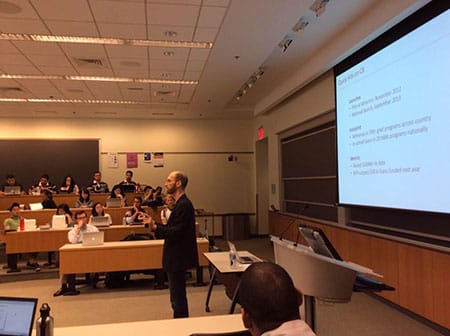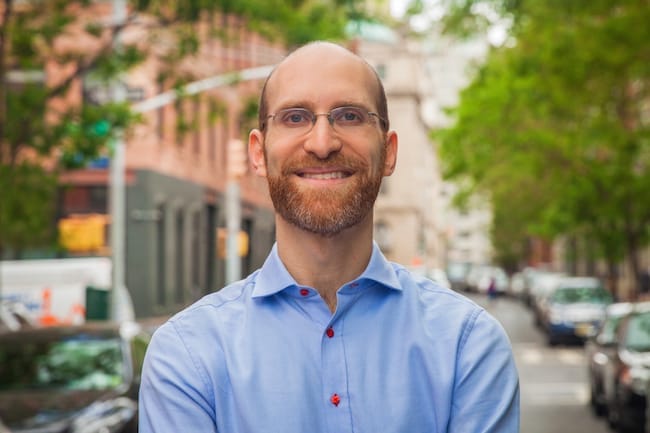David Klein came to Wharton in April 2015 with the calm mien of an entrepreneur who has wandered in the desert for the proverbial four decades and returned. He even has a beard to show for it (although his is well-kept and close, unlike one you might expect on a person returning from a sojourn in the outback).
Excuse the Old Testament analogy. It’s just that Klein has been generous enough of his time to meet with Wharton Magazine on a few occasions during his co-founding of CommonBond, and we’ve seen firsthand some changes. When we first met him in the fall of 2012, it was soon after his decision to put his Wharton MBA on hold and pursue full time his student loan startup. There was a frenetic air about him, an excitement, and a happiness and eagerness to talk to everyone and anyone about his pursuits. We next bumped into him in an elevator on campus, perhaps a year later. Not to say he was not still happy or excited. He definitely seemed a man in the midst of heavy lifting. We spoke by phone soon after, and he provided an update on CommonBond.
Then came his most recent visit to campus for a lecture sponsored by the Wharton Leadership Program. Again, Klein offered us a few minutes to catch up, and again, changes could be seen in the man, even in the way students approached him. He had become a walking, talking success story.
“Things have continued to grow as expected,” was the way he explained it to me.
When Klein, Michael Taormina and Jessup Shean WG12 L12 launched CommonBond nationally in September 2013, they had the goal of funding $100 million in graduate student loans by the end of 2014. They met and exceeded that goal. The next ceiling to surpass is $500 million in loans by end of 2015, then $1 billion in 2016. The New York City-based company has grown from its initial pilot program of giving loans solely to Wharton MBA students to students attending 20 MBA programs, and it refinances graduate student loans across more than 700 graduate programs nationally. Thirty employees are on its books, a number Klein expects to double by the end of 2015. The company has raised more than $300 million in lending capital.
Initially based on the peer-to-peer lending model—i.e., Wharton alumni helping to fund loans for Wharton students—CommonBond now receives most of its funding from institutional investors. It’s taken on the term “marketplace lender,” as have all the big peer-to-peer lending firms, says Klein. Marketplace lenders need to scale quickly to compete with incumbents in the financial services industry; growth is far easier to do with big institutional checks than chasing many little checks. Taking investments from individuals also exposes firms to higher regulatory hurdles, he explains, versus taking money from accredited investors and institutions.
In fact, the day we spoke, Klein was en route, after his Wharton talk, to chat with a well-placed government official in D.C. to discuss finance regulation and how it could be reformed to level the playing field for emerging companies. The government official wanted to understand more about what firms like CommonBond can provide, Klein explains: innovative products, better pricing and best-in-class customer service.
But before briefing the government, there was that stop on campus.
“I loved my time here. One of the more transformational experiences in my life so far,” Klein says of Wharton. “Being able to come back here is a real treat.”
He was back to share his appreciation for his time in Huntsman Hall and all Wharton has done for him, but to also impart some real-life startup lessons to current students. In two parts.
First, his early-stages lessons:
1. Get ready for resistance.
Klein can’t count how many friends and people on the street thought CommonBond was a great idea, but he remembers all of the people who thought it was impossible. But he had the mental fortitude to push on.

David Klein, co-founder of CommonBond, during his recent leadership talk in Wharton’s Huntsman Hall
“If I thought this was a really good idea and I was super committed to doing it, I wasn’t going to let anyone but the market tell us whether it works,” he says.
2. Manage self-doubt.
Klein remembers reading a Time cover story about Mother Teresa before his MBA, where it was reported that she confessed in her diary to never having stopped doubting her faith.
“If Mother Teresa can doubt her own faith, I can doubt whether this thing will ever take off or not,” he says.
Doubt is expected, doubt is normal, doubt is even beneficial.
3. Social impact is possible in a for-profit world.
CommonBond continues on its for-purpose, one-to-one model by funding the education of one underprivileged student for a full year for every fully funded loan on its platform. Klein recalls a 45-minute walk and talk through SoHo that he had with Warby Parker co-founder Neil Blumenthal WG10, when CommonBond was just getting going. One of the topics was the importance of social mission, and Klein asked Blumenthal how to best deal with investors suspect of a social mission. Blumenthal’s response was that your social mission is who you are. If investors don’t like that, they can simply not invest.
Then in his Wharton Leadership talk, he offered his later-stage lessons:
1. Capital is about human psychology as much as it is about the numbers.
You need to know the motivations and thoughts of the investors across the table to maximize your chances of securing their capital.
“Don’t get me wrong, numbers are important … but numbers just really start a conversation,” Klein says.
2. Customers are real people, not units.
The primary question should be: How do your customers feel about you? Not: How many customers do we have? That forces you first to ensure you have great products and great services. The numbers will follow.
3. Team is more important than you think.
The importance of building, and maintaining, the right team might sound cliché, but Klein’s point is that it can’t just be lip service. Founders and CEOs must know it “to the core of their being.”


























